Neurosurgery is a medical speciality concerned with diagnosing and treating patients with injury to or diseases/disorders of the brain, spinal cord, spinal column, and peripheral nerves within all body parts.
Successful treatment starts with an accurate diagnosis. The patient gets advanced neurological treatment with state-of-the-art facilities, including -
It is the safest surgical approach to treating neurological problems while minimizing the risk to speech and other vital functions.
Neurosurgery cost in India is between Rs.244200 to Rs.325600. Patient has to stay in the hospital for 5 days and outside the hospital for 30 days. The total cost of the treatment depends on the diagnosis and facilities opted by the patient.The cost of Neurosurgery includes:
Note: Babies with spina bifida who received prenatal surgery were better able to walk two and a half years after surgery than those operated on after birth and had better overall motor function.
The overall cost of the procedure also varies based on the patient's condition and preferences. Some of these factors are:
Listing approximate price of Neurosurgery and some related procedures. The prices may change depending upon the centers and condition of the patient.
| Treatment name | Cost range |
|---|---|
| CyberKnife Treatment | Rs.310800 to Rs.414400 |
| Deep Brain Stimulation (non-rechargeable) | Rs.1021200 to Rs.1361600 |
| NeuroRehabilitation | Rs.111000 to Rs.148000 |
| Brain Tumor Surgery | Rs.177600 to Rs.236800 |
| Spinal Fusion Surgery | Rs.333000 to Rs.444000 |
| Gamma Knife for AVM or Brain Tumor | Rs.275280 to Rs.367040 |
| Brain Haemorrhage Treatment | Rs.244200 to Rs.325600 |
| Pituitary Tumor Treatment | Rs.288600 to Rs.384800 |
| Hydrocephalus Treatment | Rs.155400 to Rs.207200 |
| Spine Tumour Surgery | Rs.199800 to Rs.266400 |
| Craniotomy Surgery | Rs.293040 to Rs.390720 |
| Meningioma | Rs.222000 to Rs.296000 |
| Gliomas Treatment | Rs.266400 to Rs.355200 |
| Cranioplasty | Rs.301920 to Rs.402560 |
| Cerebral Angioplasty | Rs.199800 to Rs.266400 |
All the test costs are covered in the package that is done before the neurosurgery. Neurosurgery involves different types of surgery such as craniotomy, deep brain stimulation, and VP shunts. MRI and CT scans are the major tests done before the surgery.
When the patient is hospitalized, all the mediation expenses are covered in the package. If any medicines are bought from outside the hospital, the patient must pay extra charges.
After a shunt surgery, you have to stay in the hospital for 2-4 days, and if you have stitches, they need to be removed or may dissolve. After deep brain stimulation surgery, you need to stay in the hospital for 24 hours, and the doctor will ensure that you are ready to leave. Usually, patients who undergo craniotomy for a brain tumor have to stay 3-4 days in the hospital post-surgery. If they have any postoperative difficulties, the stay may be longer. Postoperative neurosurgery follow-ups can’t be avoided and are usually scheduled 1-2 weeks after the surgery.
The price varies across the cities. Tier 1 Cities are usualy more expencive thane tier 2 cities. The price for Neurosurgery in different cities in India is approximately in the range of:
For patients planning to travel abroad it is useful to know the price in destinations popular with medical travellers. The price for Neurosurgery in different countries is approximately:
The right doctor to consult is an experienced Neurosurgeon.
Neurosurgeons are not just brain surgeons; they are medically trained neurosurgical specialists who can also help patients suffering from back and neck pain.
Listing popular specialists:

Director, 24 years of experience

<p class="rtejustify">Dr. Patir specializes in performing the following:</p> <ul> <li class="rtejustify">Neuromodulation (for pain management)</li> <li class="rtejustify">Neurovascular Surgery</li> <li class="rtejustify">Minimal Invasive Brain Surgery</li> <li class="rtejustify">Extracranial-Intracranial Bypass Surgery</li> <li class="rtejustify">Pediatric Neurosurgery</li> <li class="rtejustify">Epilepsy Surgery</li> </ul>
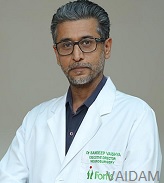
Director, 27 years of experience

<p>Dr. Sandeep Vaishya specializes in the following:</p> <ul> <li>Intracranial Brain Tumour Surgery</li> <li>Deep Brain Stimulation Surgery</li> <li>Minimally Invasive brain surgery</li> <li>Image Guided Neurosurgery</li> <li>Brachial Plexus surgery</li> <li>Spine Surgery</li> </ul>
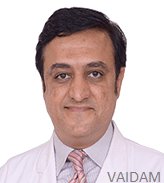
Consultant, 19 years of experience

<p class="rtejustify" dir="ltr">Dr. Arun Saroha is a Neurosurgeon in Delhi NCR, India, for various neurosurgeries, including:</p> <ul dir="ltr"> <li class="rtejustify">Pediatric Brain and Spine Surgery</li> <li class="rtejustify">Stroke Cerebrovascular Surgery</li> <li class="rtejustify">Minimally Invasive Spine Surgery </li> <li class="rtejustify">Spine Fixation and Fusion Surgery</li> <li class="rtejustify">Scoliosis Surgery</li> <li class="rtejustify">Brain Tumor Surgery </li> <li class="rtejustify">Brain Aneurysm Surgery</li> </ul>
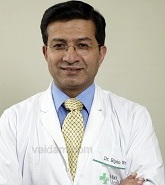
Director, 30 years of experience

Neurosurgery , Spinal Surgeries , Image guided surgery, Disc replacement, Endoscopic Disc surgery Endoscopic Cranial Surgery, Brain Tumour Surgery, Special focus on Minimally Invasive Surgery for Spinal Tumours
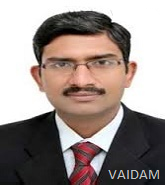
Director, 21 years of experience

<p>Dr. Aditya Gupta specializes in the following:</p> <ul> <li>Arteriovenous Malformation (AVM)</li> <li>Brain Tumor Surgery</li> <li>Radiosurgery (Cyberknife, Gamma Knife) Spine Surgery</li> <li>DBS Surgery for Parkinsons' Disease</li> <li>Brachial Plexus and Nerve Surgery</li> <li>Cerebrovascular Surgery (Aneurysms, AVMs)</li> </ul>
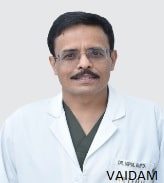
Director, 21 years of experience

Neurointerventional Surgery Endovascular treatment, Endovascular revascularization, Spinal interventions, Endovascular treatment of cerebral vasospasm by vasodilators and angioplasty, Embolization of carotid cavernous fistulas with detachable balloons or coils, Tumor embolization in head and neck region, Neurovascular Imaging

Chairman, 30 years of experience

<p class="rtejustify" dir="ltr">Dr. V. P. Singh is a neurosurgeon in Delhi NCR, India, for various neurology treatments, including:</p> <ul dir="ltr"> <li class="rtejustify">Epilepsy Surgery </li> <li class="rtejustify">Gamma Knife Surgery</li> <li class="rtejustify">Cerebrovascular Surgery</li> <li class="rtejustify">Brain Tumour Surgery</li> </ul>
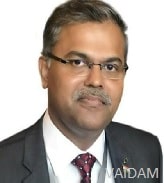
Consultant, 20 years of experience

Brain Dural Arteriovenous Fistula Embolization, CSF Rhinorrhoea Repair Surgery, Carotid Body Tumour Embolization, Brain Aneurysm Treatment, Foot Drop
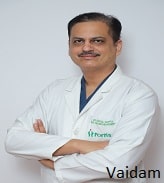
HOD, 18 years of experience

Vascular and Endovascular neurosurgery, Minimally invasive spine surgery, Pediadtric neurosurgery, Epilepsy and functional neurosurgery, Brain tumor and skull base neurosurgery
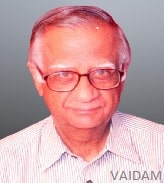
Senior Consultant, 49 years of experience

Neuro – Oncology, Brain and Spine Tumours, Cerebrovascular Surgery, Migraine, Sleep Disorders, Epilepsy, Headache, Seizures, Hyperactivity, Stroke, Head Trauma, Parkinson's Disease, Neuropathy, Alzheimer Disease, Dementia, Attention Deficit, Cranio Vertebral Anomalies
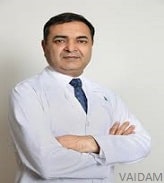
Consultant, 25 years of experience

<p dir="ltr">Dr. Sudhir Tyagi is a neurosurgeon in Delhi NCR, India, for various neurosciences and neurology treatments, including:</p> <ul dir="ltr"> <li>Acute stroke treatment</li> <li>Biofeedback therapy</li> <li>Brain mapping surgery</li> <li>Carotid angioplasty</li> <li>Carotid endarterectomy (carotid artery surgery)</li> <li>Carotid stenting</li> <li>Cervical and lumbar disk replacement (arthroplasty)</li> <li>Cranial base surgery</li> <li>Decompression surgery</li> <li>Deep brain stimulation (DBS)</li> <li>Brain pacemaker</li> <li>Discectomy or microdiscectomy</li> <li>Foraminotomy</li> <li>Guglielmi detachable coil (GDC) procedure </li> <li>Intraoperative angiography (IOA)</li> <li>Kyphoplasty</li> <li>Laminectomy</li> </ul>

Head of Department, 17 years of experience

<p class="rtejustify" dir="ltr">Dr. Arun L. Naik is a Neurosurgeon in Delhi NCR, India, for various neurosurgeries, including:</p> <ul dir="ltr"> <li class="rtejustify">Re-do Brain Tumor Surgery</li> <li class="rtejustify">Framed and Frameless Stereotactic Surgery</li> <li class="rtejustify">CV Junction Surgery</li> <li class="rtejustify">Neurovascular Surgery</li> <li class="rtejustify">Endoscopic Brain and Spine Procedures</li> <li class="rtejustify">Movement Disorders Procedures</li> <li class="rtejustify">Functional Neurosurgery for Pain and Spasticity</li> </ul>

Senior Consultant, 26 years of experience

<p class="rtejustify" dir="ltr">Dr. Siddhartha Ghosh is a Neurosurgeon in Delhi NCR, India, for various neurosurgeries, including:</p> <ul dir="ltr"> <li class="rtejustify">Skull Base Surgery</li> <li class="rtejustify">Pediatric Neurosurgery</li> <li class="rtejustify">Neuro-oncology</li> <li class="rtejustify">Stereotactic Neurosurgery</li> <li class="rtejustify">Spine Surgery</li> <li class="rtejustify">Vascular Surgery</li> </ul>
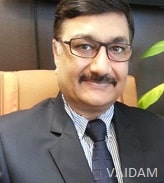
Consultant, 21 years of experience

<p>Dr. Paresh K. Doshi is a Neurosurgeon in Delhi NCR, India, for various neurosurgeries, including:</p> <ul> <li>Brain Tumor Surgery</li> <li>Deep Brain Stimulation </li> <li>Epilepsy Surgery</li> <li>Surgery for Movement Disorders, including Parkinson's Disease</li> </ul>
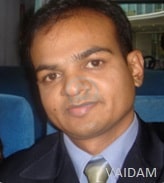
Consultant, 20 years of experience

Neurosurgery Neuro-Oncology Spine Surgery Spine Related Disorders Pediatric Neurosurgery Acoustic Neuroma Removal Artificial Disc Replacement Anterior Cervical Herniated Disc Surgery
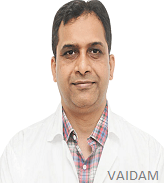
Head of Department, 15 years of experience

Minimal Invasive Spine Surgery, Trigeminal Neuralgia Surgery, Stereotactic Radiosurgery, Paediatric Neurosurgery
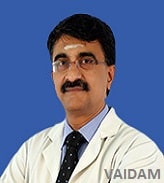
Senior Consultant, 32 years of experience

Herniated disc Neck hernia Spinal Canal Stenosis Neurosis Spondylolisthesis (Waist Shift) Brain Tumors Brain Diseases Nerve entrapment Hand numbness
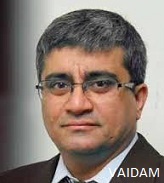
Consultant, 28 years of experience

Chest Pain Treatment Deep Brain Stimulation Gamma-Knife Radiosurgery Brain infection Laminectomy Spine Surgery
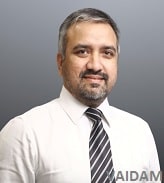
Consultant, 26 years of experience

Deep brain stimulation, Craniotomy, Brain Tumour Treatment
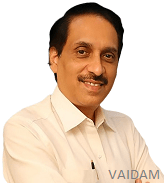
Consultant, 24 years of experience

Minimally invasive spine surgery, Neuro Endoscopy, Brain & Spine surgery
On average, the success rate of brain surgery is between 50-70%.
Our Services for Neurosurgery in India
Transparent - Professional - Without Hassles






NABH Certified Healthcare Discovery Platform
Vaidam is NABH certified healthcare discovery platform that will connect you to top-notch medical experts, hospitals, wellness options, and trusted travel partners to help identify and make the right healthcare choices.

Researched & Personalized Treatment Plan - Under One Roof
You can search for the best hospitals, read about them, view photographs of the facilities at the hospitals and the places at which the hospitals are located, and check the cost of treatment.

Quality Treatment Within Your Budget
As soon as you post an enquiry, the patient relation team will collect details from you, share them with the doctors and hospitals on Vaidam's panel, and get a personalized treatment plan. We research to get quality treatment within your budget.

Treatment to Travel
Vaidam concierge assists patients, to get medical Visa, the best airline fares and arrangements for your stay. Our concierge also helps you with daily travel, language, and food concerns. Vaidam does everything to be your perfect host. All of Vaidam’s services are free of cost to patients.

International Reach
Vaidam Health has network in 15+ countries, which includes India, Turkey, UAE, Germany, South Korea, Thailand, Malaysia, Spain.
Note: Vaidam Health does not provide medical advice, diagnosis or treatment. The services and information offered on www.vaidam.com are intended solely for informational purposes and cannot replace the professional consultation or treatment by a physician. Vaidam Health discourages copying, cloning of its webpages and its content and it will follow the legal procedures to protect its intellectual property